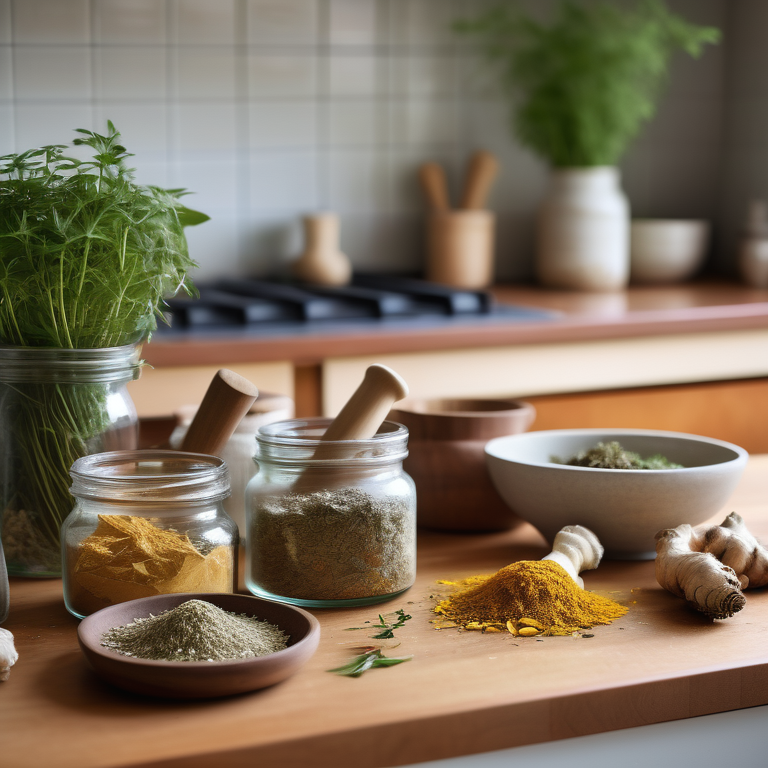Key Highlights
- The liver plays a crucial role in the body’s digestion and metabolism processes, making it essential to maintain its health.
- Certain herbs, such as milk thistle, dandelion root, turmeric, licorice root, burdock root, artichoke leaf, ginger root, green tea, schisandra berry, and boldo leaves, have been found to be beneficial for liver health.
- These herbs have various properties that support liver function, including protecting liver cells, promoting detoxification, reducing inflammation, and supporting liver regeneration.
- Incorporating these herbs into your diet can be a natural and effective way to enhance your liver health.
- It is important to follow precautions and consult with a healthcare provider before using herbal remedies for liver health.
Introduction
The liver is the largest organ in the digestive system and plays a vital role in maintaining overall health. It is responsible for processing nutrients, detoxifying harmful substances, producing bile, and storing essential vitamins and minerals. However, factors such as poor diet, excessive alcohol consumption, medication use, and exposure to toxins can put a strain on the liver and lead to liver damage or disease. This is why incorporating liver detox methods, such as a liver cleanse, into your routine can greatly benefit your overall health and well-being.
To maintain optimal liver health, it is important to support its function and provide it with the necessary nutrients. While there are various ways to support liver health, incorporating herbs into your diet can be an effective and natural approach. Many herbs have been found to possess properties that enhance liver health and promote its proper functioning.
In this blog, we will explore the top 10 herbs for liver health and their benefits. These herbs include milk thistle, dandelion root, turmeric, licorice root, burdock root, artichoke leaf, ginger root, green tea, schisandra berry, and boldo leaves. We will discuss how these herbs can support liver function and provide precautions for their safe usage.
By incorporating these herbs into your diet and following a healthy lifestyle, you can enhance your liver health and promote overall well-being.
Top 10 Herbs for Enhancing Liver Health
When it comes to supporting liver health, there are several herbs that have been found to be particularly beneficial. These herbs include:
1. Milk Thistle: The Protector
Milk Thistle, also known as Silybum marianum, is a powerful herb that has been used for centuries to promote liver health. It contains a compound called silymarin, which is known for its antioxidant properties and ability to protect liver cells from damage.
The liver is constantly exposed to various toxins and harmful substances, which can lead to oxidative stress and damage to liver cells. Milk thistle helps combat oxidative stress by neutralizing free radicals and reducing inflammation in the liver. This protective action helps prevent liver damage and promotes the regeneration of liver cells.
Studies have shown that milk thistle may be beneficial for individuals with liver diseases such as hepatitis, cirrhosis, and fatty liver disease. It has been found to improve liver function, reduce liver inflammation, and support overall liver health.
To incorporate milk thistle into your diet, you can take it in the form of capsules, tinctures, or teas. It is important to follow the recommended dosage and consult with a healthcare provider before starting any herbal supplement.
Overall, milk thistle is a valuable herb for liver health that can provide protection and support for the liver’s essential functions.
2. Dandelion Root: The Detoxifier
Dandelion root, also known as Taraxacum officinale, is a herb that has been used for centuries for its detoxifying properties. It is particularly beneficial for liver health due to its ability to stimulate bile production.
Bile is a substance produced by the liver that aids in the digestion and elimination of fats and toxins from the body. By increasing bile production, dandelion root helps the liver flush out harmful toxins and waste products more efficiently.
Dandelion root also has diuretic properties, meaning it promotes urine production and helps eliminate excess fluid from the body. This can be beneficial for individuals with liver diseases such as cirrhosis or ascites, where fluid buildup in the abdomen can occur.
In addition to its detoxifying properties, dandelion root is rich in antioxidants and vitamins that support overall liver health. It can be consumed as a tea or taken in the form of capsules or tinctures.
It is important to note that dandelion root may interact with certain medications, so it is advisable to consult with a healthcare provider before incorporating it into your routine.
Overall, dandelion root is a natural detoxifier that can support liver health and aid in the elimination of harmful toxins from the body.
3. Turmeric: The Anti-Inflammatory Powerhouse
Turmeric, also known as Curcuma longa, is a vibrant yellow spice commonly used in Indian cuisine. It contains a compound called curcumin, which is known for its anti-inflammatory and antioxidant properties.
Inflammation plays a significant role in liver diseases such as fatty liver disease and liver inflammation. Turmeric can help reduce liver inflammation by inhibiting the production of inflammatory compounds in the body.
Turmeric has been found to be particularly beneficial for individuals with fatty liver disease, a condition characterized by the buildup of excess fat in the liver. It supports the breakdown of fats in the liver and helps prevent the progression of fatty liver disease to more severe liver conditions.
In addition to its anti-inflammatory properties, turmeric also supports liver detoxification processes. It aids in the production of bile, which helps eliminate toxins from the liver and promotes overall liver health.
To incorporate turmeric into your diet, you can add it to curries, smoothies, or golden milk. You can also take it in the form of capsules or supplements. It is important to choose high-quality turmeric products and consult with a healthcare provider before starting any new supplement.
Overall, turmeric is a powerful herb that can help reduce liver inflammation, support liver detoxification, and promote overall liver health.
4. Licorice Root: The Antiviral Herb
Licorice root, also known as Glycyrrhiza glabra, has been used in traditional medicine for its numerous health benefits. It is particularly beneficial for liver health due to its antiviral properties.
Viral infections can have a detrimental effect on liver function and lead to liver diseases such as hepatitis. Licorice root contains compounds that have been found to exhibit antiviral activity against various viruses, including those that affect the liver.
By inhibiting viral replication, licorice root can help protect the liver from viral infections and promote overall liver health. It also supports liver function by promoting the production of liver enzymes that aid in detoxification processes.
Licorice root is available in various forms, including teas, capsules, and extracts. It is important to choose high-quality licorice root products and follow the recommended dosage. It is also advisable to consult with a healthcare provider before using licorice root, especially if you have any underlying health conditions or are taking medications.
Overall, licorice root is an effective herb for liver health that can help protect against viral infections and support liver function.
5. Burdock Root: The Blood Purifier
Burdock root, also known as Arctium lappa, has been used in traditional medicine for its detoxifying properties. It is particularly beneficial for liver health due to its ability to act as a blood purifier.
The liver plays a crucial role in filtering and eliminating harmful substances from the blood. Burdock root supports this process by promoting the elimination of toxins from the blood and enhancing liver detoxification.
Burdock root also contains antioxidants that help protect liver cells from damage caused by free radicals. It supports overall liver health and aids in the elimination of waste products from the body.
In addition to its liver-supporting properties, burdock root has anti-inflammatory effects that can help reduce liver inflammation and promote liver health.
Burdock root can be consumed as a tea, taken in the form of capsules or tinctures, or added to soups and stir-fries. It is important to choose high-quality burdock root products and follow the recommended dosage. It is also advisable to consult with a healthcare provider before using burdock root, especially if you have any underlying health conditions or are taking medications.
Overall, burdock root is a natural blood purifier that can support liver health and promote the elimination of harmful substances from the body.
6. Artichoke Leaf: The Cholesterol Reducer
Artichoke leaf, also known as Cynara scolymus, has been used for centuries for its medicinal properties. It is particularly beneficial for liver health due to its ability to reduce cholesterol levels and support liver function.
High cholesterol levels can contribute to the development of liver diseases such as fatty liver disease and liver inflammation. Artichoke leaf contains compounds that help reduce cholesterol levels in the body, thereby supporting liver health.
In addition to its cholesterol-lowering properties, artichoke leaf supports liver function by promoting the production of bile. Bile aids in the digestion and elimination of fats and toxins from the body, allowing the liver to function optimally.
Artichoke leaf can be consumed as a tea, taken in the form of capsules or tinctures, or added to salads and dishes. It is important to choose high-quality artichoke leaf products and follow the recommended dosage. It is also advisable to consult with a healthcare provider before using artichoke leaf, especially if you have any underlying health conditions or are taking medications.
Overall, artichoke leaf is a natural cholesterol reducer that can support liver health and promote overall well-being.
7. Ginger Root: The Digestion Helper
Ginger root, also known as Zingiber officinale, is a popular herb known for its culinary and medicinal uses. It is particularly beneficial for liver health due to its ability to support the digestive system and promote the production of liver enzymes.
The digestive system plays a crucial role in the absorption and elimination of nutrients and waste products. Ginger root helps support the digestive system by stimulating the production of digestive enzymes, which aid in the breakdown and absorption of nutrients.
Ginger root also supports liver enzymes, which play a crucial role in detoxification processes in the liver. By promoting the production of liver enzymes, ginger root helps enhance liver function and supports overall liver health.
In addition to its digestive and liver-supporting properties, ginger root has anti-inflammatory effects that can help reduce liver inflammation and promote liver health.
Ginger root can be consumed in various forms, including fresh, dried, powdered, or as a tea. It can be added to various dishes, smoothies, or consumed as ginger tea. It is important to choose fresh and high-quality ginger root and consult with a healthcare provider before using ginger root, especially if you have any underlying health conditions or are taking medications.
Overall, ginger root is a versatile herb that can support digestion, enhance liver function, and promote overall liver health.
8. Green Tea: The Antioxidant Boost
Green tea, derived from the Camellia sinensis plant, is known for its numerous health benefits. It is particularly beneficial for liver health due to its high content of antioxidants, known as catechins.
Antioxidants help protect the body’s cells, including liver cells, from damage caused by free radicals. Free radicals are unstable molecules that can cause oxidative stress and lead to cell damage and inflammation. By neutralizing free radicals, green tea supports liver health and prevents oxidative damage.
Green tea has been found to have powerful antioxidant properties, making it an excellent choice for promoting liver health. It also supports liver function by promoting the production of liver enzymes that aid in detoxification processes.
To incorporate green tea into your diet, you can drink it as a hot or cold beverage. It is important to choose high-quality green tea and avoid adding excessive sugar or sweeteners.
It is advisable to consult with a healthcare provider before incorporating green tea into your routine, especially if you have any underlying health conditions or are taking medications.
Overall, green tea is a natural antioxidant boost that supports liver health and provides protection against oxidative damage.
9. Schisandra Berry: The Stress Fighter
Schisandra berry, also known as Schisandra chinensis, is an adaptogenic herb that has been used in traditional Chinese medicine for its stress-fighting properties. It is particularly beneficial for liver health due to its ability to support the body’s response to stress.
Stress can have a negative impact on liver health, leading to inflammation and liver damage. Schisandra berry helps the body adapt to stress and reduces the harmful effects of stress on the liver.
In addition to its stress-fighting properties, schisandra berry has antioxidant properties that protect liver cells from damage caused by free radicals. It also supports liver function by promoting the production of liver enzymes that aid in detoxification processes.
Schisandra berry can be consumed as a tea, taken in the form of capsules or tinctures, or added to smoothies and juices. It is important to choose high-quality schisandra berry products and follow the recommended dosage. It is also advisable to consult with a healthcare provider before using schisandra berry, especially if you have any underlying health conditions or are taking medications.
Overall, schisandra berry is a powerful stress fighter that supports liver health and promotes overall well-being.
10. Boldo Leaves: The Liver Cell Regenerator
Boldo leaves, derived from the Peumus boldus tree, have been used in traditional medicine for their liver-supporting properties. They are particularly beneficial for liver health due to their ability to support liver cell regeneration.
The liver has the remarkable ability to regenerate itself, and boldo leaves can help enhance this process. They contain compounds that stimulate liver cell regeneration and support the overall health and function of liver cells.
Boldo leaves also have antioxidant properties that protect liver cells from damage caused by free radicals. They support liver detoxification processes and aid in the elimination of harmful substances from the body.
Boldo leaves can be consumed as a tea, taken in the form of capsules or tinctures, or added to herbal blends. It is important to choose high-quality boldo leaf products and follow the recommended dosage. It is also advisable to consult with a healthcare provider before using boldo leaves, especially if you have any underlying health conditions or are taking medications.
Overall, boldo leaves are a natural liver cell regenerator that supports liver health and promotes the regeneration of liver cells.
Understanding the Benefits of Herbal Remedies for Liver Health
Maintaining liver health is vital for overall well-being, as the liver plays essential roles in digestion, metabolism, and detoxification. Herbal and natural remedies can provide support for liver health by protecting liver cells, promoting detoxification, reducing inflammation, and supporting liver regeneration. Incorporating these herbal and natural remedies into your diet can help enhance liver function and promote optimal liver health.
How Herbs Support Liver Function
Herbal remedies can support liver function in several ways. They contain compounds that protect liver cells from damage, promote the production of liver enzymes, aid in detoxification processes, and support liver regeneration.
For example, milk thistle contains antioxidant properties that protect liver cells from oxidative stress and damage. Dandelion root stimulates bile production, which aids in the digestion and elimination of toxins. Turmeric reduces liver inflammation and supports the breakdown of fats in the liver. Licorice root exhibits antiviral properties that protect the liver from viral infections. Burdock root acts as a blood purifier and aids in the elimination of harmful substances from the body. Artichoke leaf reduces cholesterol levels and supports liver function. Ginger root stimulates the production of digestive enzymes and liver enzymes. Green tea provides antioxidant protection and supports liver function. Schisandra berry helps the body adapt to stress and protects liver cells. Boldo leaves stimulate liver cell regeneration and support overall liver health.
By incorporating these herbs into your diet, you can provide valuable support to your liver and promote its proper functioning.
Synergistic Effects of Herbs on Liver Health
When it comes to liver health, the combination of different herbs can have synergistic effects that enhance their individual benefits. The combined action of these herbs can provide greater support to liver function and promote overall liver health.
For example, the antioxidant properties of milk thistle and green tea can work together to neutralize free radicals and protect liver cells from oxidative damage. Dandelion root and ginger root can complement each other by supporting bile production and aiding digestion. Turmeric and licorice root can work synergistically to reduce liver inflammation and protect liver cells from viral infections. The blood-purifying properties of burdock root and artichoke leaf can enhance the elimination of toxins from the body. Schisandra berry and boldo leaves can support liver cell regeneration and protect liver cells from stress and damage.
By combining these herbs in your diet or using herbal blends that contain multiple liver-supporting herbs, you can maximize the benefits and promote optimal liver health.
Precautions and Safe Usage of Herbs
While herbal remedies can provide valuable support for liver health, it is important to take precautions and use them safely. Here are some important considerations:
- Recognizing Quality Herbal Supplements: Choose high-quality herbal supplements from reputable manufacturers to ensure their safety and efficacy. Look for products that have been tested for purity and potency.
- Avoiding Interactions with Medications: Some herbs may interact with certain medications, affecting their effectiveness or causing adverse effects. It is important to consult with a healthcare provider before using herbal remedies, especially if you are taking medications.
By following these precautions and using herbal remedies under the guidance of a healthcare provider, you can ensure their safe and effective usage for liver health.
Recognizing Quality Herbal Supplements
When using herbal supplements for liver health, it is important to choose high-quality products from reputable manufacturers. Here are some tips for recognizing quality herbal supplements:
- Research the Manufacturer: Look for information about the manufacturer, their reputation, and their commitment to quality. Check if they follow good manufacturing practices and have their products tested for purity and potency.
- Read Labels and Certifications: Look for certifications such as GMP (Good Manufacturing Practice) or NSF (National Sanitation Foundation) on the product labels. These certifications indicate that the manufacturer follows strict quality standards.
- Check for Standardized Extracts: Standardized extracts ensure that the product contains a consistent amount of active compounds. Look for supplements that specify the standardized extract on the label.
- Consult with a Healthcare Provider: It is advisable to consult with a healthcare provider before using herbal supplements, especially if you have any underlying health conditions or are taking medications. They can provide guidance on dosage, potential interactions, and overall safety.
By recognizing quality herbal supplements and using them under the guidance of a healthcare provider, you can ensure their efficacy and safety for liver health.
Avoiding Interactions with Medications
Herbal remedies can interact with certain medications, affecting their effectiveness or causing adverse effects. It is important to be aware of potential interactions and consult with a healthcare provider before using herbal remedies, especially if you are taking medications.
Here are some important considerations:
- Inform Your Healthcare Provider: It is essential to inform your healthcare provider about any herbal remedies you are using or planning to use, as well as any medications you are taking. They can assess the potential for interactions and provide guidance on safe usage.
- Research Potential Interactions: Conduct thorough research on potential interactions between herbal remedies and medications. Check reputable sources such as medical journals or consult with a qualified herbalist for accurate information.
- Follow Medical Advice: Follow the advice of your healthcare provider regarding the use of herbal remedies alongside medications. They may recommend adjusting dosages, monitoring for side effects, or avoiding certain combinations.
By taking these precautions and seeking medical advice, you can minimize the risk of interactions between herbal remedies and medications and ensure your safety and well-being.
Incorporating Herbs into Your Diet for Liver Health
Incorporating herbs into your diet can be an effective way to support liver health. Here are some tips for incorporating herbs into your diet:
- Use Fresh or Dried Herbs: Use fresh or dried herbs in your cooking to add flavor and enhance the nutritional value of your meals. For example, add fresh ginger or turmeric to stir-fries or use dried herbs like dandelion root or milk thistle in herbal teas.
- Make Herbal Infusions or Teas: Brew herbal infusions or teas using herbs like green tea, ginger root, or schisandra berry. These beverages can provide a refreshing way to consume herbs and support liver health.
- Consider Herbal Supplements: If it is challenging to incorporate enough herbs into your diet, consider herbal supplements that contain a combination of liver-supporting herbs. Consult with a healthcare provider to determine the appropriate dosage and duration.
By incorporating herbs into your diet, you can provide valuable support for your liver and promote its proper functioning.
Simple Herbal Teas for Daily Detox
Herbal teas can be an excellent way to incorporate liver-supporting herbs into your daily routine. Here are some simple herbal teas for daily detox and liver cleansing:
- Ginger and Turmeric Tea: Brew a combination of fresh ginger and turmeric in hot water. Add a squeeze of lemon juice and a teaspoon of honey for added flavor. Ginger and turmeric have anti-inflammatory properties and support liver function.
- Dandelion Root Tea: Steep dried dandelion root in hot water for a few minutes. Dandelion root helps stimulate bile production and aids in liver detoxification.
- Milk Thistle Tea: Brew dried milk thistle seeds or leaves in hot water. Milk thistle has antioxidant properties and protects liver cells from damage.
- Green Tea with Lemon: Brew green tea and add a squeeze of lemon juice. Green tea is rich in antioxidants and supports liver function.
By incorporating these herbal teas into your daily routine, you can provide valuable support for your liver and promote its detoxification processes.
Recipes Incorporating Liver-Healthy Herbs
Incorporating liver-healthy herbs into your recipes can be a delicious and nutritious way to support liver health. Here are some recipe ideas that incorporate liver-healthy herbs:
- Turmeric-Ginger Smoothie: Blend together fresh turmeric, ginger root, pineapple, spinach, and coconut milk. This smoothie is rich in antioxidants and anti-inflammatory compounds that support liver health.
- Roasted Vegetables with Dandelion Pesto: Roast a variety of vegetables such as broccoli, cauliflower, and carrots. Top with a homemade pesto made from dandelion leaves, garlic, olive oil, and pine nuts. Dandelion leaves support liver detoxification.
- Green Tea-Marinated Salmon: Marinate salmon in a mixture of brewed green tea, lemon juice, and garlic. Grill or bake until cooked through. Green tea provides antioxidant protection for the liver.
- Artichoke and Chickpea Salad: Combine cooked chickpeas, artichoke hearts, cherry tomatoes, and fresh herbs such as parsley and mint. Drizzle with a dressing made from olive oil, lemon juice, and garlic. Artichoke supports liver function.
By incorporating these liver-healthy herbs into your recipes, you can create flavorful dishes that promote liver health and overall well-being.
The Science Behind Liver Health and Herbal Remedies
The science behind liver health and herbal remedies is based on extensive research and studies. These studies have shown that certain herbs possess properties that support liver function, protect liver cells, and promote liver detoxification and regeneration. The active compounds present in these herbs have been found to have antioxidant, anti-inflammatory, antiviral, and hepatoprotective effects. By understanding the science behind liver health and herbal remedies, we can make informed choices about incorporating them into our diet and lifestyle.
Studies Supporting the Efficacy of Herbs for Liver Support
Studies have shown that certain herbs have significant efficacy in supporting liver health. One such herb is milk thistle, which has been extensively studied for its liver-protective properties. Research suggests that milk thistle extract, specifically the active component silymarin, can help reduce liver inflammation, protect liver cells from damage, and promote liver cell regeneration. Another herb with proven liver support is dandelion root. Studies have demonstrated that dandelion root extract can enhance liver function by increasing bile production, improving digestion, and reducing oxidative stress on liver cells. Turmeric, a well-known spice, contains a compound called curcumin that has been found to have anti-inflammatory and antioxidant effects. Research indicates that curcumin can protect against liver damage, prevent fatty liver disease, and alleviate symptoms of liver inflammation. Green tea is another herb that has shown promise in supporting liver health. The catechins present in green tea have been found to reduce liver fat accumulation, improve liver function, and protect against liver injury. These studies provide strong evidence for the efficacy of these herbs in promoting liver health.
Mechanisms of Action: How Herbs Work in the Body
Herbs for liver health work through various mechanisms of action to support liver function and promote overall liver health. One of the main mechanisms is their ability to reduce inflammation in the liver. Chronic inflammation can lead to liver damage and impair liver function. Herbs like milk thistle and turmeric contain compounds that have been shown to inhibit inflammatory pathways and reduce inflammation in the liver. Another way herbs support liver health is by promoting liver cell regeneration. Some herbs, such as milk thistle and dandelion root, have been found to stimulate the growth of new liver cells and repair damaged liver tissue. Additionally, herbs like dandelion root and green tea enhance the liver’s detoxification process by increasing bile production and improving digestion. This helps the liver eliminate toxins and harmful substances more efficiently. A text table detailing the mechanisms of action of these herbs can be seen below:
| Herb | Mechanisms of Action |
| Milk thistle | Reduces inflammation, promotes liver cell regeneration, enhances detoxification |
| Dandelion root | Improves bile production, supports digestion, reduces oxidative stress |
| Turmeric | Anti-inflammatory, antioxidant, protects against liver damage |
| Green tea | Reduces liver fat accumulation, improves liver function, protects against liver injury |
These mechanisms of action contribute to the overall liver health benefits of these herbs.
Conclusion
In conclusion, incorporating these top 10 herbs for liver health into your daily routine can significantly enhance liver function and overall well-being. From milk thistle’s protective properties to turmeric’s anti-inflammatory benefits, these herbs offer a natural way to support liver health. Remember to prioritize quality when choosing herbal supplements and be cautious of potential interactions with medications. By understanding the science behind herbal remedies and their synergistic effects on liver health, you can take proactive steps towards maintaining a healthy liver. Embrace the power of nature’s remedies for optimal liver function and well-being.
Frequently Asked Questions
What are the first signs of liver damage?
The first signs of liver damage can vary and may include fatigue, jaundice (yellowing of the skin and eyes), abdominal pain, and swelling in the legs and ankles. It is important to consult a healthcare provider for early detection and proper diagnosis of liver disease.
How often should I cleanse my liver with herbs?
The frequency of liver cleansing with herbs depends on various factors, including your overall health and any specific liver conditions you may have. It is recommended to consult a healthcare provider for personalized advice on how often to cleanse your liver with herbs.
Can these herbs help with fatty liver disease?
Yes, certain herbs like milk thistle and dandelion root have been found to have beneficial effects on fatty liver disease. These herbs can help improve liver health, reduce inflammation, and support weight loss, which are important factors in managing fatty liver disease. However, it is important to make lifestyle changes and consult a healthcare provider for a comprehensive treatment plan.
Are there any herbs I should avoid for liver health?
While herbs can be beneficial for liver health, it is important to be cautious and consult a healthcare provider before using any herbal remedies, especially if you have a pre-existing liver condition. Some herbs may have contraindications or interact with medications, so it is best to seek medical advice to ensure safety and avoid any potential harm to the liver.








